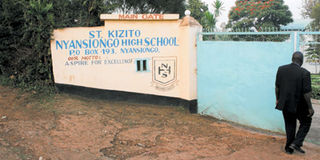Standards fall in class warfare

St Kizito Nyansiongo school is one of those whose academic standards have dropped because of church versus community tussles over its control. Photo/SULEIMAN MBATIAH
The fight for control of schools in Nyamira has led to a fall in academic standards.
The new county government will have to find a formula to resolve the decades-old simmering war between communities and churches.
And the most affected are secondary schools many of which are performing poorly in national examinations.
At war are the dominant Catholics and Seventh Day Adventists.
The Anglicans, Lutherans and Pentecostal Assembly of God play a peripheral role in the feuds.
“Although no one wants to tell it from the mountain, the reality here is that every church sponsoring a particular school wants a principal and deputy to come from their faith even if they do not have the right qualification,” says Mrs Isabella Omache, an education officer at Borabu District headquarters.
Since independence
This, she says, has gone on since independence and no leader in the region wants to confront the matter.
“The outcome is that such heads end up mismanaging schools leading to poor results,” she says.
Like many people in the region, Ms Omache thinks the county government could be best placed to resolve the problem.
“It must be the priority of the new county to face it head on, get down and talk to the churches to be patrons and not administrators,” she recommends.
St Kizito Nyansiongo High school and Menyenya Seventh Day Adventist High school in Borabu are some of the schools that used to shine in exams but this is no more.
At Menyenya, the leading student in last year’s KCSE got a B+ when many schools in the neighbouring Kisii county had A scores.
Principal Stephen Momanyi acknowledges that sponsors insist that the school head must be a member of their churches.
“The sponsors (church) insist on schools’ leadership, but they play no role on motivational programmes such as creating incentives for teachers and students who excel by giving them bursaries,” he says.
But Mr Momanyi also says the post-election violence affected the school because most teachers ran away fearing for their lives.
“The competition between churches in some cases has been positive while in other places it has been negative,” says John Matiangi, the Kenya National Union of Teachers Borabu branch executive secretary.
The churches, he says, want the school boards and administration to be members of their faith
Not possible
“It is not practically possible to have everyone on a school board coming from one faith and we have discussed this issue in number forums without much success,” he says.
As the standards in Nyamira drop, some parents are voting with their feet by taking their children to schools outside the county.
For instance, those who live in areas bordering Kisii take their children there while the rich take them to far off private boarding schools to avoid crossing paths with churches.
It is not the same in other fields of education like universities, technical training and teachers colleges where the churches play no role.
The tertiary institutions operate without the stiffling influence of churches and people in the county want more to be established.
Nyamira did not benefit from the recent move by the government to upgrade two secondary schools in each of the 47 counties into national institutions.
The elevation of Nyambaria Boys and Sironga Girls may come in phase two, according to Education minister Prof Sam Ongeri.
But given the way schools are managed in the county, it is clear that the elevation may not change their performance much.
The interference of sponsoring churches, clannism and politicians is endemic.
Many churches protect head teachers who are poor managers from being demoted and replaced by competent ones from different denominations.
It is extremely difficult for an SDA faithful to head an institution sponsored by the Catholic Church and vice versa.
Some of the former academic giants in the county like Matongo, Nyansiongo, Nyansabakwa, Rangenyo and Gekano have been victims of this problem.
They are no longer competing effectively nationally.
Some improvement
But a few schools like the SDA-sponsored Nyambaria Boys and Sironga Girls have shown some improvement in recent years.
SDA pastor Richard Nyakego, who chairs the board of Sironga Girls said the church insists on one of their own being at the helm of the institutions they sponsor ‘’in order to uphold the denomination’s principles and values’’.
“We always want children who go through our learning institutions to grow physically, spiritually and academically. That is why we insist that heads who lead them must adhere to the principles of the church to avoid conflicts,” he said.
But at times the church may allow a non-believer to manage its institutions “so long as the person given that responsibility accepts to adhere to the principles of the denomination.”
His sentiments were echoed by the Catholic Church.
Fr Joseph Obanyi, the personal assistant of Bishop Joseph Mairura of Kisii diocese said: “Insisting on having these appointments is to maintain the spiritual tradition of our faith in the schools we sponsor.”
He said the church appoints four people to boards of secondary schools and three to those of primaries.
‘The appointment of principals and their deputies has to be done in consultation with us,” he says. The board chairman is also a man or woman of Catholic faith
However, he acknowledged the church was alive to the feelings of communities around the schools they sponsor.
“Where there is a deserving principal who is not from our faith, we usually find a way out but the church will still maintain its faith in the school,” he says.
Catholic priest Thomas Matoke supported this view. “At times we accept head teachers from different denominations to head Catholic schools where we are not able to have one of our own,” he said, citing Eronge Secondary School, Nyamwetureko and Nyakwerema schools which are headed by SDA teachers as examples.




